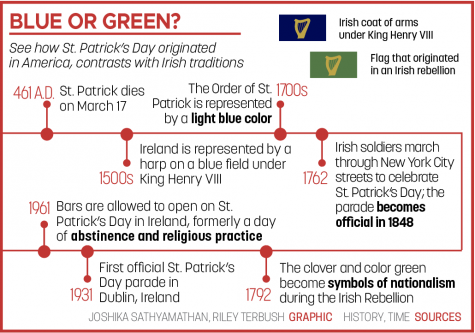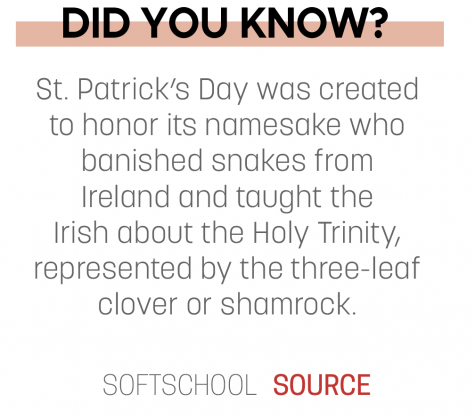Despite growing up in the U.S., senior Maylee O’Brien always felt connected to her Irish heritage.
“A couple years ago, my family visited Ireland and it was probably my favorite trip of all time,” she said. “It was absolutely beautiful, and the experience allowed me to feel connected to my roots.”
IB psychology teacher Peter O’Hara also said he felt Irish culture is an important part of his life.
“In a very prevalent spot in (my) house, I have my coat of arms. We have my personal coat of arms on mugs. We celebrate our Irish heritage just by the way we carry ourselves in our discussions,” he said.
According to the U.S. Census Bureau, 34.5 million Americans claim Irish ancestry, a number seven times larger than the population of Ireland itself. In fact modern St. Patrick’s Day celebrations didn’t begin in Ireland but in America, as a way for Irish-Americans to remember their identity while staying patriotic to their new country. In modern times St. Patrick’s Day acts as a day to celebrate Irish culture. The holiday’s popularity and importance eventually led the U.S. Congress to proclaim March as Irish-American Heritage Month in 1991.

“St. Patrick’s Day is good because it brings (Irish culture) out to the forefront,” O’Hara said. “My grandfather would tell the story about how his father came from Ireland, and they were (coal) miners and did a lot of work on building railroads. They were able to work themselves up to being pretty prominent citizens. (St. Patrick’s Day) reminds everyone that the Irish had a big stake in creating our country.”
Sadee Paulson, a sophomore with Irish heritage, said she believed St. Patrick’s Day is more of an American holiday than an Irish one.
“I think that (St. Patrick’s Day) is definitely more of an American holiday because…everyone in America dresses up and (celebrates) for it, and I don’t think (the holiday) is as big of a deal in Ireland.”
O’Brien said she believes there can be many stereotypes attached to St. Patrick’s Day or being Irish.
“Drinking at pubs and eating a lot of potatoes are probably the most common Irish stereotypes,” she said. “Typically St. Patrick’s Day is associated with a lot of drinking. Additionally, this isn’t necessarily a stereotype, but also the leprechaun and his pot of gold.”
O’Hara said he agreed that many of the stereotypes were present but also said he thinks not all of them are negative.
“That people go out and drink too much is the biggest stereotype, and that’s not always true. But I don’t know of too many (stereotypes). Irish are pretty happy-go-lucky people, and so I don’t think there’s a lot of them. It’s one holiday where people tend to have fun, so there’s not a lot of negativity with St. Patrick’s Day.”
Paulson said she agreed. “I feel like there are a few (stereotypes), but I’m not affected much by them. The only ones that I (am affected by) are about having red hair.”
Computer science teacher Theresa Kane was born and raised in Ireland, and said she believes many stereotypes associated with the country itself were disappearing. 
“The Irish demographic has changed so much over the years that it is hard to find somebody who is purely from Ireland. There’s just been so many people coming into Ireland over the past couple of years,” she said. “It’s hard to attach a stereotype when the country for the past twenty or thirty years has been going through such rapid dynamic growth.”
Despite the stereotypes associated with being Irish, St. Patrick’s Day has taken on many different meanings for those who celebrate it.
Kane said she sees the day as a way to recognize Irish independence.
“(St. Patrick’s Day) is an opportunity to spend time with friends and family, and to reflect on Ireland’s history. Ireland was once a colony of Great Britain, and in 1922, Saorstát Éireann (the free state of Ireland) was declared,” she said. “I normally, on St. Patrick’s Day, will get together with some friends and we watch a movie called “Michael Collins”, and that tells the story of how the Republic of Ireland achieved its freedom from Great Britain.”
O’Brien sees St. Patrick’s Day as a day to celebrate her family’s ancestry. “I believe St. Patrick’s Day is a holiday focused on having fun while also embracing my heritage,” she said. “Typically, my family will celebrate with a traditional Irish meal.”
Regardless of the holiday’s Irish roots, O’Hara said he believed St. Patrick’s Day was a celebration for everyone.
“I think most Irish have assimilated into America such that our culture in itself is not really exclusive to anybody,” he said. “On St. Patrick’s Day, everybody’s Irish and everybody celebrates.”


































![AI in films like "The Brutalist" is convenient, but shouldn’t take priority [opinion]](https://hilite.org/wp-content/uploads/2025/02/catherine-cover-1200x471.jpg)









































![Review: “The Immortal Soul Salvage Yard:” A criminally underrated poetry collection [MUSE]](https://hilite.org/wp-content/uploads/2025/03/71cju6TvqmL._AC_UF10001000_QL80_.jpg)
![Review: "Dog Man" is Unapologetically Chaotic [MUSE]](https://hilite.org/wp-content/uploads/2025/03/dogman-1200x700.jpg)
![Review: "Ne Zha 2": The WeChat family reunion I didn’t know I needed [MUSE]](https://hilite.org/wp-content/uploads/2025/03/unnamed-4.png)
![Review in Print: Maripaz Villar brings a delightfully unique style to the world of WEBTOON [MUSE]](https://hilite.org/wp-content/uploads/2023/12/maripazcover-1200x960.jpg)
![Review: “The Sword of Kaigen” is a masterpiece [MUSE]](https://hilite.org/wp-content/uploads/2023/11/Screenshot-2023-11-26-201051.png)
![Review: Gateron Oil Kings, great linear switches, okay price [MUSE]](https://hilite.org/wp-content/uploads/2023/11/Screenshot-2023-11-26-200553.png)
![Review: “A Haunting in Venice” is a significant improvement from other Agatha Christie adaptations [MUSE]](https://hilite.org/wp-content/uploads/2023/11/e7ee2938a6d422669771bce6d8088521.jpg)
![Review: A Thanksgiving story from elementary school, still just as interesting [MUSE]](https://hilite.org/wp-content/uploads/2023/11/Screenshot-2023-11-26-195514-987x1200.png)
![Review: "When I Fly Towards You", cute, uplifting youth drama [MUSE]](https://hilite.org/wp-content/uploads/2023/09/When-I-Fly-Towards-You-Chinese-drama.png)
![Postcards from Muse: Hawaii Travel Diary [MUSE]](https://hilite.org/wp-content/uploads/2023/09/My-project-1-1200x1200.jpg)
![Review: "Ladybug & Cat Noir: The Movie," departure from original show [MUSE]](https://hilite.org/wp-content/uploads/2023/09/Ladybug__Cat_Noir_-_The_Movie_poster.jpg)
![Review in Print: "Hidden Love" is the cute, uplifting drama everyone needs [MUSE]](https://hilite.org/wp-content/uploads/2023/09/hiddenlovecover-e1693597208225-1030x1200.png)
![Review in Print: "Heartstopper" is the heartwarming queer romance we all need [MUSE]](https://hilite.org/wp-content/uploads/2023/08/museheartstoppercover-1200x654.png)




